Carrying white man’s burden for 61 years
by Janaka PERERA
Last Wednesday was Sri Lanka’s first independence commemoration day
in almost three decades that people have had the freedom to raise the
Lion flag in all parts of the island. It also marks the final stage of
the nation’s second independence struggle. It is the campaign to defend
the country’s sovereignty and territorial integrity against a home-grown
enemy aided and abetted by dubious foreign elements - some masquerading
as friendly powers.
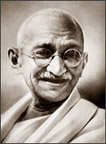 |
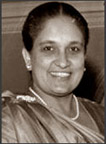 |
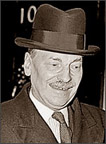 |
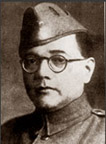 |
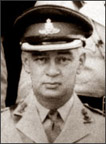 |
Mahathma
Gandhi |
Sirima
Bandaranaike |
Clement
Attlee |
Subhas Chandra Bose |
Col. F. C. de Saram |
The success of our valiant Armed Forces in this 30-year-long
anti-insurgent operation has also clearly exposed the patriots and
traitors - the latter being not only the LTTE but also those hatching
constitutional plots to devolve power to create ethnic Bantustans in Sri
Lanka.
Their attempts of course have to be nipped in the bud if this country
is to return to her roots and re-discover her pre-colonial heritage,
which has been something alien to `Uncle Toms’ in our society who still
want to carry the white man’s burden. Some even hate the Lion flag and
not all of them are Tigers.
When the British introduced to Sri Lanka ethnic representation in
politics and administration under their `divide and rule’ policy on
communal lines it was the recipe for today’s socio-political morass that
we find ourselves mired in.
The last King of Kandy and two of his predecessors were Tamils. But
what mattered to the Kandyan Sinhala people was not really the monarch’s
ethnicity but that they upheld the country’s time-hallowed cultural and
religious traditions and the ancient laws and customs.
Buddhist-Hindu harmony thus helped Sinhala-Tamil amity. But our
immediate post independence governments never seriously studied this.
When colonialism ended many of our leaders and middle-class citizens
had turned into `coconuts` (people with brown skins and white minds)
listening to mostly to the dictates of the Christian churches which had
been colonial proxies.
Remember that in 2005 the then Prime Minister Ranil Wickremesinghe
wanted to celebrate the 500th anniversary of the Portuguese encounter!
When Sri Lanka celebrated the golden jubilee of her independence our
chief guest was Prince Charles. On that day our First Citizen Chandrika
Bandaranaike delivered her address in English.
Often you find here people who say it would have been better for us
if we had continued to be a British colony. Others say that the English
should have been the official language rather than Sinhala or Tamil.
Such expressions display their half-baked knowledge of colonial rule
and of Sri Lanka’s history. It is a reflection of a confused society
that is still groping in the dark 61 years after the British departed.
Slumber
They however did not depart from India and Sri Lanka for the reasons
that we have been made to believe all these years. We need to explode
the myth that the British gave up their Jewel in the Crown - India -
because of Mahathma Gandhi’s non-violent struggle and civil disobedience
campaign - that Sri Lanka too regained freedom through non-violent
campaign in the form of agitating for Constitutional reforms. Of course
Gandhi made a great impression on the world, won many admirers among
friend and foe alike and inspired many to follow his ideals. But his
campaign did not really drain Britain’s economic resources or affect its
military power.
Before 1939, the British were in no great hurry to grant self-rule to
their colonies, despite the fact that nationalist movements were trying
their utmost to undermine the empire. It however did not take long for
the British to wake up from their deep slumber. The outbreak of World
War II in 1939 heralded the end of the empire on which the sun was never
supposed to set. Until the Japanese onslaught that began in 1941 the
British Raj’s transplanted European lifestyle had insulated the white
colonialists from the dark-skinned natives. The success of Japan in
humbling the United States, Britain and the Netherlands in the early
days of the Pacific Theatre of War dealt a mortal blow to Western
prestige and its colonial control of Asia.
Now Britain was fighting with its back to the wall and the white
imperialists desperately sought the loyalty of the natives in
prosecuting the war. The possibility of sabotage and collaboration with
the enemy could not be ruled out. (Years after the World War, President
Jayewardene revealed how he and Dudley Senanayake had met the Japanese
Consul in Colombo to offer their co-operation - shortly before
hostilities began - in the event of a Japanese landing in Sri Lanka.)
Loyalty
In India, patriots were in a dilemma. According to Indian author
Kushwant Singh, the crux of it was whether to go all out to aid Britain
in the war and then demand freedom for themselves or insist on a
declaration of independence and then put their full weight behind the
Western allies. To the British, India’s loyalty was crucial in winning
the war. Indian soldiers played a major role in the fight against the
Axis powers (Germany, Italy and Japan). A section of these troops
however joined the fiery Indian nationalist leader Subhas Chandra Bose
who formed the Japanese-backed Indian National Army (INA) to fight the
British.
According to Major General Mohan Singh of the INA, “the British had
not given even an empty promise to grant us complete freedom after the
war”. (The Readers’ Digest Illustrated History of World War II)
But the war left Britain a battered and impoverished second-class
power and not all the rhetoric of Winston Churchill could disguise this.
Despite the victory over the Axis powers the global conflict was the
final blow to the British empire. Being realists the British knew their
game was up. Prime Minister Clement Attlee went ahead with what
Churchill would not and drew plans to `liquidate’ the empire on which
`the sun would never set.’
Coming back to Sri Lanka, her post-independence rulers - having lost
their bearings - simply continued from where the British left off -
instead of trying to go back to our roots as far as possible in the
modern context to build a strong national image. The first danger signal
of this failure was the attempt on January 27, 1962 to overthrow the
Sirima Bandaranaike Government.
The conspirators were a group of military and police officers that
belonged to a generation, which was virtually alienated from Sri Lanka’s
history, culture and traditions and consequently failed to comprehend
the complex and sometimes controversial socio-political changes that
swept Sri Lanka since 1956. Until that year the no post-independence Sri
Lankan ruler really attempted to undo the injustices done to the Sinhala
majority under colonial rule - despite the fact even foreigners like
Col. Henry Steele Olcott had drawn attention to them long before we
regained independence. Such national figures as the Anagarika Dharmapala
and L.H. Mettananda too raised these issues. But they were virtually
ignored. The disastrous consequences of this indifference towards the
majority have been hardly surprising.
Roots
The `political and spiritual heirs’ of the conspirators of 1962 are
however still with us. But they do not wear uniforms. Instead they are
in civvies having become `anti-war crusaders,’ and `human rights’
champions calling for `negotiated settlements, `peace’ and `power
sharing’ with the separatists. They seldom dare to condemn U.S. or
British human rights violations in Iraq or Afghanistan but will not
hesitate to condemn the Sri Lankan security forces operations against
the LTTE at the drop of a hat.
On this issue of national identity, Dr. Gunadasa Amarasekera quoting
Samuel Huntington (in Who Are We?) writes:
“Throughout American history, people who were not white Anglo-Saxon
Protestants have become Americans by adopting America’s Anglo Protestant
Culture and political values.
This benefited them and the country. American National identity and
unity, as Benjamin C. Schwarz has said, derived `from the ability and
willingness of an Anglo-American elite to stamp its image on other
peoples coming to this country’.” (Sunday Island, December 17, 2006)
The latest example of this is President Barack Obama.
This is what we Sri Lankans need to follow in going back to our
roots.
It has to be the basis of our education system, which is today almost
totally divorced from our historical, social and geographical reality -
which was the foundation of our culture, economy and way of life. We
have failed to prevent the lack of proficiency in English from becoming
an obstacle to wider public participation in national progress. We
confused the importance of learning English with the English-speaking
mentality which we inherited from the white masters.
The foundation of a nation’s self-confidence is built on linking its
economic system with the social values and language of the masses.
( Courtesy: The Asian Tribune )
|


